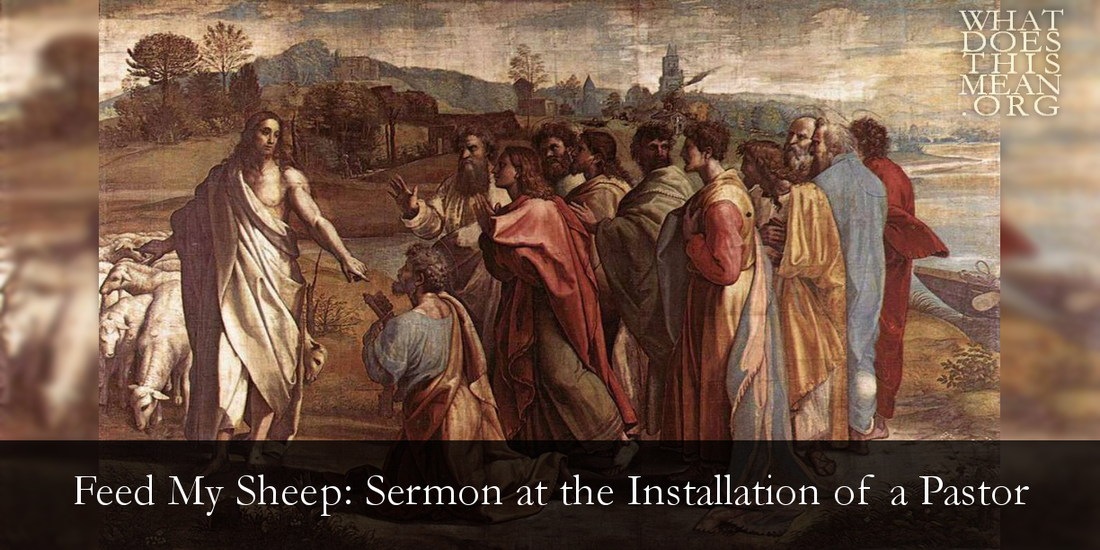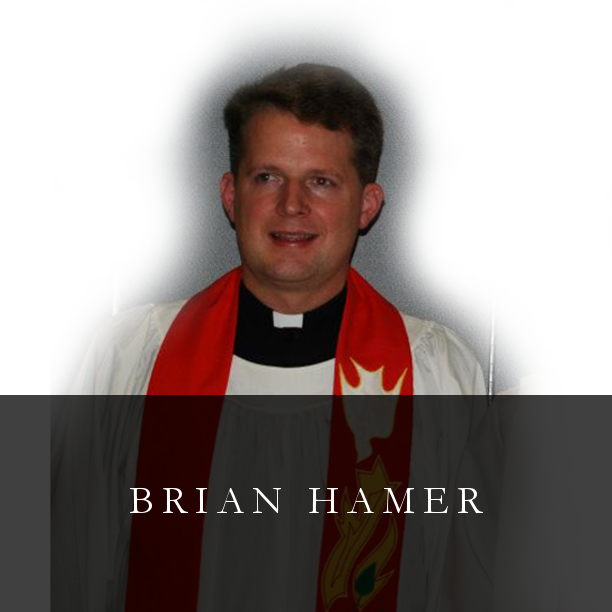Malachi 2:5-7; II Timothy 4:1-5; St. John 21:15-17
Installation of Rev. Jimmy Coffey
Holy Trinity Lutheran Church
New Hyde Park, NY
Epiphany IV + 30 January 2011 + 3:00 p.m.
+ Jesu Juva +
Feed My Sheep.
– St. John 21:17
St. Paul then turns his attention from the “we believe” statements to “we reject” statements. “For the time is coming,” says St. Paul, “when people will not endure sound teaching, but having itching ears they will accumulate for themselves teachers to suit their own passions.” Instead of being obedient to the Divine Word of God, those with itching ears place themselves above the word of God and create their own false teachings to suit their felt needs. Very early in the pastoral epistles, St. Paul warns Timothy of “fornicators, sodomites, kidnappers, liars, perjurers” and “any other thing that is contrary to sound doctrine” (I Tim 1:10). And he speaks the hard truth when he tells Timothy that “in latter times some will depart from the faith, giving heed to deceiving spirits and doctrines of demons” (I Tim 4:1). So what should young Timothy do when his life and ministry are threatened by false teachers? “Mark [the false teachers] and avoid them” (Rom 16:17), lest his flock turn from the truth and wander into myths.
Such is life under the cross for those who bear in their own bodies the marks of the crucified One (Gal 6:17). It is fitting, Pastor Coffey, that you gave a presentation in 2007 on the theology of the cross in the life of the eighteenth century Lutheran poet and pastor, Paul Gerhardt (1607-1676). He lived the theology of the cross and suffering, and wrote eloquently about it in his hymns. As the pastors who are here today will no doubt attest, the “we reject,” rather than “we believe” statements, led Gerhardt and others into suffering and, in some cases, to martyrdom. Gerhardt was literally run out of town for his confessional subscription to The Book of Concord, a subscription that you, Pastor Coffey, will re-articulate this afternoon. We face a similar form of persecution for the “we reject” statements in Christian doctrine. Just try it in the public square some time. If you say, “I believe that Jesus Christ is Lord,” not everyone will agree, but you might get away with it as long as you couch your confession as interfaith tolerance. But try confessing in public that Christ crucified is the only way to salvation; that living together without marriage is wrong; that unborn children have the same right to life as the rest of us, and you will be dismissed as elitist, narrow, and sectarian. In the tradition of St. Paul, you might even be martyred for your faith. But the admonition of St. Paul rings true: “Preach the Word.” In so doing, you feed the flock what the word of truth and equip them to reject all that is false. As the hymns puts it, “Let no false doctrine me beguile; Let Satan not my soul defile. Give strength and patience unto me / To bear my cross and follow Thee” (LSB 708.2).
If today’s Epistle focuses on preaching the Word to the flock, then our Gospel focuses on feeding the flock. Christ had died for our sins according to the Scriptures. He had risen from the dead, triumphant over sin and death. And now He was appearing to His disciples and others, that they might believe that Jesus was the Christ, the Son of God (Jn 20:31). After catching 153 fish by the Lord’s command, and enjoying a seaside breakfast of fish and chips, Jesus gave a threefold charge to Peter: “Feed my lambs … Tend my sheep … Feed my sheep.” A number of things strike me about this admonition to Peter. For one thing, it happened at meal time. Indeed, many of Jesus’ resurrection appearances happened at meal times or involved eating: a piece of broiled fish in the upper room (Luke 24:41-43), the road to Emmaus, with an evening meal in His presence (Luke 24:13-35), and now breakfast by the sea. So eating and resurrection appearances go together, setting the precedent that we would celebrate the Lord’s Supper on the Lord’s Day, knowing that every celebration of the Sacrament is another resurrection appearance of our Lord. Also significant about this story is the threefold admonition for Peter to feed the flock. In the original language, each command is worded differently, using various combinations of the verbs “feed” and “tend,” along with the nouns, “lamb” and “sheep.” The composite picture here is the fulfillment of Psalm 23. Here sheep safely graze in the presence of their shepherd, walk beside the still waters of Baptism, and drink from the chalice of the Lord’s Supper.
It is fitting, Pastor Coffey, that your ordination text at Redeemer Ft. Wayne (1999) was the Good Shepherd reading from John 10[:1-16]. I was not there to hear it, but our mutual spiritual father, the late Kurt Marquart, preached on the Good Shepherd theme, no doubt contrasting the hireling with the shepherd. The hireling is just a hired hand. He is paid for his services, but cares nothing for the sheep (Jn 10:12-13). To echo the concerns of C. F. W. Walther about church and ministry, we regret that many today have adopted precisely what our fathers warned us against, viz. a “hire and fire” mentality. For the sheep, how many voters’ meeting revolve around what we hired this pastor to do and whether or not he did it, followed inevitably by a performance review, no doubt rooted in numerical growth? For the shepherds, there is now something known as a “non-tenured call,” a round about way of saying a temporary call, i.e., a trial period for the pastor. The temporary “call” says, in effect, “Let’s live together without marriage for a few years, and see if things work out – numerically, financially, and socially. Then we’ll think about a contract extension for the pastor. Otherwise, he will become a free agent.” And the list of ways that we have thwarted John 10 and resisted the NT pattern of shepherding goes on and on.
But see how the shepherd-sheep theme has shaped your ministry, Pastor Coffey. One of your first tasks at Greenwich was to host the Society of the Good Shepherd, a monthly study group for pastors to better equip themselves to feed the flock. Your work in the ministry since 1999 has been exactly that: faithful shepherding. Through papers and presentations, from the pulpit to the classroom, at the altar and at the sick bed, in the United States and in multiple mission trips overseas, you have been a faithful shepherd of the flock, which Christ purchased with His own blood. No wonder the crozier or shepherd’s staff is present for this service, a visual reminder of who we are as shepherd and sheep. In the midst of the numerous controversies over the church and ministry today, the shepherd’s staff reminds us of the true reason for existence of pastor and congregation: feeding and being fed. Pastor Coffey, feed this flock which Christ has purchased with His own blood (Acts 20:28). You, the members of Holy Trinity, receive the messenger and his message, for true instruction is found in his mouth as he preaches the Word (Mal 2:6; 2 Tim 4:2) and administers the sacraments.
And so today, following your installation as the pastor in this place, the first words to be exchanged between shepherd and sheep will be the Apostolic greeting: “The Lord be with you / And with your spirit.” These words are based in part on St. Paul’s last words to young Pastor Timothy, “The Lord be with your spirit” (2 Tim 4:22). From ancient times, they have been exchanged between pastor and people before the Collect of the Day, at the beginning of the Communion liturgy (as we will use them today), and before the prayers at Matins and Vespers. These words are also called “the little ordination” because they recall the special measure of the Holy Spirit given to the one who is ordained or ordered to preach and feed in this place. So in the midst of the debates on American soil over the doctrine of church and ministry, these words remind us that the Lord is with His pastors, for he has placed the truth in their mouths. And He is with you, the flock in this place, through the work of baptizing, preaching, and feeding. Yes, Christ the Good Shepherd is with His church, working through you to fulfill His charge, “Feed my sheep.”
God grant it unto us for Jesus’ sake. Amen.



 RSS Feed
RSS Feed
